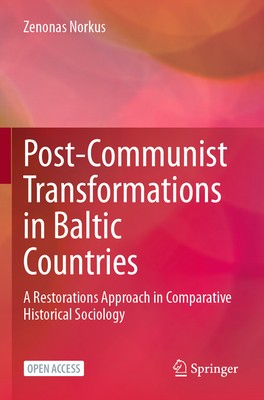
- Išsiųsime per 10–14 d.d.
- Autorius: Zenonas Norkus
- Leidėjas: Springer
- ISBN-10: 3031394984
- ISBN-13: 9783031394980
- Formatas: 15.6 x 23.4 x 1.7 cm, minkšti viršeliai
- Kalba: Anglų
- Extra -15 % nuolaida šiai knygai su kodu: ENG15
Post-Communist Transformations in Baltic Countries + nemokamas atvežimas! | knygos.lt
Atsiliepimai
Aprašymas
This book provides a survey of the economic, health, and somatic progress of Baltic countries during the period 1918-2018, framed by the outline of the historical-sociological theory of modern social restorations, as originally conceived by the Austrian-American comparative historian Robert A. Kann. The author reworks Kann's theory to analyse post-communist transformations in the Baltic region. The book argues that the purpose of modern social restorations is to make restoration societies safe against a recurrence of revolution. It discusses the social history of the Baltic countries to show that most post-Napoleonic restorations were brief, because they failed to economically and socially outperform the prerevolutionary and postrevolutionary systems. It deems Baltic restorations as laboratory cases of second-wave modern social restorations, because they encompass a triple restoration of the nation-state, capitalism, and democracy. The book assesses the economic and social performance success of Baltic restorations during the periods of original independence (1918-1940), foreign-imposed state socialism (1940-1990), and restored independence (since 1940). It then assesses the ultimate performance success of these restorations by 2040, when restored Baltic states may endure longer than their ancestors in 1918-1940 and the complete foreign occupations era (1940-1990). The author, an expert in historical sociology, uses extensive historical-statistical data in cross-time comparisons to develop his analysis and create future projections. This book is of wide interest to sociologists, social demographers, political scientists, and economists studying the Baltic region.
This is an open access book.
EXTRA 15 % nuolaida
Kupono kodas: ENG15
Akcija baigiasi už 5d.00:12:11
Nuolaidos kodas galioja perkant nuo 10 €. Nuolaidos nesumuojamos.

- Autorius: Zenonas Norkus
- Leidėjas: Springer
- ISBN-10: 3031394984
- ISBN-13: 9783031394980
- Formatas: 15.6 x 23.4 x 1.7 cm, minkšti viršeliai
- Kalba: Anglų
This book provides a survey of the economic, health, and somatic progress of Baltic countries during the period 1918-2018, framed by the outline of the historical-sociological theory of modern social restorations, as originally conceived by the Austrian-American comparative historian Robert A. Kann. The author reworks Kann's theory to analyse post-communist transformations in the Baltic region. The book argues that the purpose of modern social restorations is to make restoration societies safe against a recurrence of revolution. It discusses the social history of the Baltic countries to show that most post-Napoleonic restorations were brief, because they failed to economically and socially outperform the prerevolutionary and postrevolutionary systems. It deems Baltic restorations as laboratory cases of second-wave modern social restorations, because they encompass a triple restoration of the nation-state, capitalism, and democracy. The book assesses the economic and social performance success of Baltic restorations during the periods of original independence (1918-1940), foreign-imposed state socialism (1940-1990), and restored independence (since 1940). It then assesses the ultimate performance success of these restorations by 2040, when restored Baltic states may endure longer than their ancestors in 1918-1940 and the complete foreign occupations era (1940-1990). The author, an expert in historical sociology, uses extensive historical-statistical data in cross-time comparisons to develop his analysis and create future projections. This book is of wide interest to sociologists, social demographers, political scientists, and economists studying the Baltic region.
This is an open access book.




Atsiliepimai